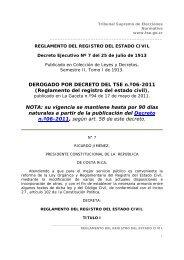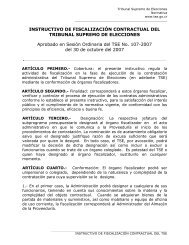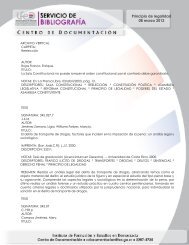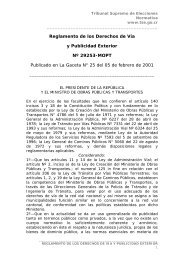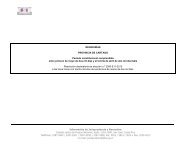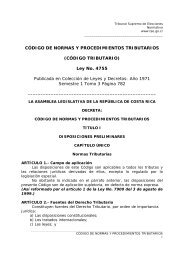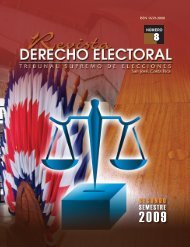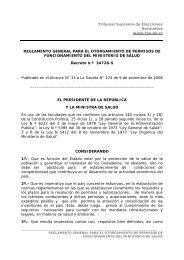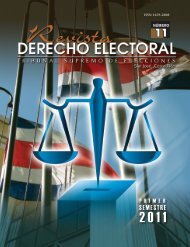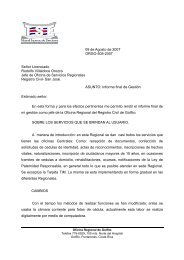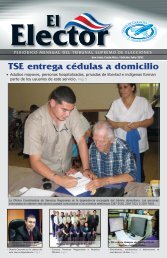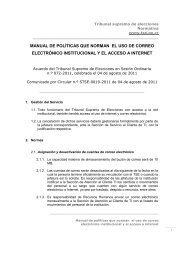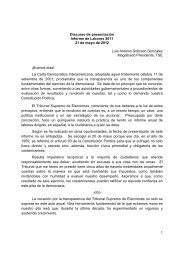9 - Tribunal Supremo de Elecciones
9 - Tribunal Supremo de Elecciones
9 - Tribunal Supremo de Elecciones
Create successful ePaper yourself
Turn your PDF publications into a flip-book with our unique Google optimized e-Paper software.
Reforma al Código Electoral:<br />
cambios en las funciones y estructura <strong>de</strong>l TSE<br />
Max Alberto Esquivel Faerron *<br />
Hugo Picado León **<br />
Nota <strong>de</strong>l Consejo Editorial<br />
Recepción: 21 <strong>de</strong> diciembre <strong>de</strong> 2009.<br />
Revisión, corrección y aprobación: 22 <strong>de</strong> enero <strong>de</strong> 2010.<br />
Resumen: Este artículo tiene como objeto <strong>de</strong>scribir y explicar los principales cambios introducidos por<br />
el Código Electoral costarricense promulgado en setiembre <strong>de</strong> 2009 en el régimen organizativo <strong>de</strong>l<br />
<strong>Tribunal</strong> <strong>Supremo</strong> <strong>de</strong> <strong>Elecciones</strong>. El texto se organiza en cuatro partes: la primera se <strong>de</strong>dica a explicar los<br />
antece<strong>de</strong>ntes <strong>de</strong> la reforma electoral; la segunda se refiere al cambio <strong>de</strong> paradigmas entre la concepción<br />
<strong>de</strong>mocrática <strong>de</strong> la anterior legislación y la contenida en el proceso <strong>de</strong> reforma; la tercera parte <strong>de</strong>scribe<br />
los cambios en las atribuciones legales <strong>de</strong>l TSE y, finalmente, la cuarta sección analiza los cambios en la<br />
estructura <strong>de</strong>l TSE, colocando el énfasis en la creación <strong>de</strong> la Dirección General <strong>de</strong>l Registro Electoral y <strong>de</strong><br />
Financiamiento <strong>de</strong> los Partidos Políticos, así como <strong>de</strong>l Instituto <strong>de</strong> Formación y Estudios en Democracia<br />
(IFED).<br />
Palabras clave: Reforma Electoral / Código Electoral / Organismos Electorales / <strong>Tribunal</strong> <strong>Supremo</strong> <strong>de</strong><br />
<strong>Elecciones</strong>.<br />
Abstract: The aim of this paper is to <strong>de</strong>scribe and explain the most important changes introduced in the<br />
Supreme Electoral <strong>Tribunal</strong> (TSE) by the new Costa Rican Electoral Co<strong>de</strong> enacted in September 2009. It<br />
is organized in four sections: the first one is <strong>de</strong>dicated to explain the origins of the electoral reform; the<br />
second one, explains the change of paradigms between the <strong>de</strong>mocratic conceptualization of the former<br />
legislation and the one content in the reform process; the third section <strong>de</strong>scribes the changes in the legal<br />
functions of the TSE and finally, the forth section analyzes the TSE structural changes, emphasizing on the<br />
creation of the General Direction of Electoral Registry and Funding of Political Parties and of the Institute<br />
of Formation and Studies in Democracy (IFED).<br />
Key Words: Electoral Reform / Electoral Co<strong>de</strong> / Electoral Bodies / Supreme Electoral <strong>Tribunal</strong>.<br />
* Max Alberto Esquivel Faerron es Magistrado <strong>de</strong>l <strong>Tribunal</strong> <strong>Supremo</strong> <strong>de</strong> <strong>Elecciones</strong>; abogado y politólogo, anteriormente fue<br />
Defensor Adjunto <strong>de</strong> los Habitantes, ejerce la docencia en la Universidad <strong>de</strong> Costa Rica. mesquivel@tse.go.cr<br />
** Hugo Picado León es Letrado <strong>de</strong>l <strong>Tribunal</strong> <strong>Supremo</strong> <strong>de</strong> <strong>Elecciones</strong>; abogado y politólogo, ejerce la docencia en la Universidad<br />
<strong>de</strong> Costa Rica. hpicado@tse.go.cr<br />
NÚMERO 9 / PRIMER SEMESTRE 2010 113



